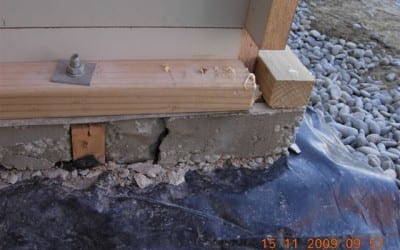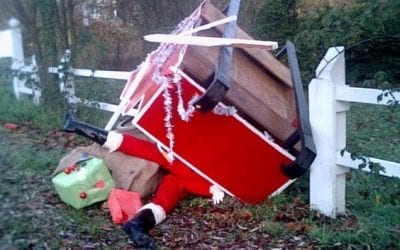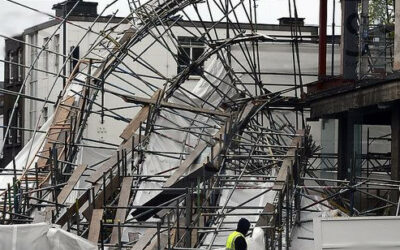Hoping for nothing to go wrong is a common strategy used by many unsuccessful businesses. A more effective strategy used by successful business owners is planning for nothing to go wrong. It starts with a mindset of assuming that if something can go wrong, it will, so taking steps to prevent those things from happening is simply a no-brainer. Having eliminated or minimised threats, all that is left is the opportunities and a path to success.
We’ve developed a checklist to help construction professionals plan for nothing to go wrong in their business.
PROTECTING ASSETS
TOOLS & EQUIPMENT
– Are these engraved with your phone, LBP or drivers license number? This helps Police contact you if they are recovered after a theft.
– Are they stored securely (eg. an Armorgard Ox Box or similar secure storage box while in vehicles or on site)?
– Can they be located if stolen (eg. via GPS tracking technology)?
– Do you have an asset register with details of the items, cost, serial number etc? You can use a simple spreadsheet or an app like Hoist or Tool Protect.
– Are phones, tablets and computers password protected and backed up and is your virus protection up to date?
– Is your stuff insured? Get an instant quote at www.builtin.co.nz/tools
VEHICLES
– Do they have alarms/immobilisers installed?
– Do they have fire extinguishers on board?
– Are they parked securely overnight (eg. off street)?
– Are they visible during the day and locked while you’re on site?
– Are trailers secured with a towball lock or wheel clamp?
– Have you checked that all drivers have a valid license?
– Do you conduct driver safety training for your staff and promote a safe driving culture?
– Are your vehicles insured for the right amount?
CONSTRUCTION SITES
– Are these securely fenced?
– Are tools removed from site each day?
– Are materials and appliances installed as soon as they’re delivered (not delivered on a Friday or left sitting around on site for days)?
– Have you ensured existing structures are protected from damage in the event of an unexpected storm/rain event?
– Are proper briefings given to all contractors working at the site, not just on health and safety but also on awareness of good practice to minimise damage to the works (eg. storage and handling of materials)?
– Are cameras or alarms needed to prevent theft/vandalism?
– Are staff trained on how to handle/clean glass?
– What weather events are a risk to the site and can additional measures be taken to reduce the risk of damage from an unexpected downpour etc?
– Are the works insured for the correct amount through until practical completion, including any existing structures on site?
BUILDINGS
– Do you have fire extinguishers (and have they been serviced)?
– Are battery units stored/charging safely in fire proof containers?
– Is rubbish removed from site and not stored in public view against the building?
– Is wood dust vented and regular cleaning undertaken to avoid the build up of flammable particles?
– Do you have fire alarms and/or sprinklers (and have they been serviced)?
– Are burglar alarms installed and monitored?
– Do all doors and windows have security locks?
– Are valuables stored in a safe?
– Have you had a recent electrical safety check?
– Have fences and gates around yards been inspected and reinforced where necessary?
OTHER
– Are there other assets you own that need to be reviewed?
– Are there other risks specific to your assets that you need to take into account?
– Are you insured for any increased costs of working or lost profit if something happened to affect your ability to continue trading?
– Do you have a business continuity/disaster recovery/back up plan in place, so that if a major event hits you can get back up and running quickly?
PREVENTING LIABILITY
HEALTH & SAFETY
– Are your policies up to date and regularly communicated?
– Are you complying with your obligations as a PCBU?
– Have you conducted an audit of your procedures & processes?
– Are staff adequately trained?
– Have you instilled a good culture of health & safety within your staff and with subbies that attend site?
THIRD PARTY PROPERTY
– Do you undertake a pre-start audit when working on or around property owned by other people to identify risk areas? do you take the proper precautions to prevent damage or loss to it?
– If you perform hotwork (eg. welding, torching on membranes, grinding/cutting etc) are the right precautions being taken in compliance with best practice/standards?
– If you’re digging, do you always check plans, contact the Council and comply with best practice/standards if there are underground services nearby?
– Are the subbies you work with competent, experienced and properly briefed before attending your jobs?
– Do you have appropriate insurance that properly reflects the work you perform (including work you have done in the past)?
LEGAL & CONTRACT COMPLIANCE
– Are you supplying your residential building clients with the required checklist and disclosure statements if the total job is worth more than $30k (incl GST) or on request?
– Are you using a comprehensive, professional written contract in all cases (legally required if the job is worth more than $30k)?
– Are you complying with your obligations under law, such as:
– Companies Act
– Building Act
– Health & Safety at Work Act
– Fair Trading Act
– Resource Management Act
– Are you reading and fully understanding the terms of any contracts you are entering into, such as those with designers and engineers as well as main contractors or principals (and seeking professional advice if you don’t)?
– Are all contract variations agreed in writing?
– Do you have a legal adviser you can rely on?
– Are all staff complying with their obligations as an LBP?
STAFF/EMPLOYMENT/HR
– Do you have your HR essentials right? These include:
– Employment agreements that are legally compliant
– Job descriptions/schedule of duties for each employee
– Employment & health & safety policies are well documented and communicated
– Do you have an HR adviser you can rely on?
– Are you following the correct practices in the event of a grievance or staffing issue?
– Have you planned for if a key staff member (or business owner-operator) was injured or became ill and couldn’t continue working?
QUALITY CONTROL & COMMUNICATION
– Do you have a robust construction/project management system and process in place to minimise errors?
– How do you evaluate potential customers to see if taking on the work outweighs the risks?
– Do you have a clear communication plan and process for dealing with clients?
– Do you have quality control staff (such as an experienced foreman on site) to ensure work is completed to the right standard?
– Are you working with suppliers and products that you are familiar with, have good specifications, local representation and a credible warranty?
– Are you ensuring that workers installing complex or unfamiliar products or systems are properly trained and can refer to guidance if necessary?
– Does your business have a good culture of quality control and communication?
FINANCIAL STRENGTH
FINANCIAL POSITION
– Do you have a good understanding of what financial measures are important to a business?
– Do you review your business’ financial position, including cashflow, against key indicators at least monthly?
– Do you have an experienced bookkeeper to manage your accounts?
– Do you use specialist software to manage your accounts?
– Do you sit down with your accountant or financial adviser at least every 6 months to review your business performance?
QUOTING & PRICING
– Do you use an experienced QA or pricing software when tendering/quoting for work?
– Do you back cost all your jobs?
CREDIT CONTROL & CASH FLOW
– Do you have a cash flow forecast for a rolling next 12 months (this allows you to identify issues take corrective action early)?
– Do you have a robust credit control process, so that overdue accounts are followed up immediately?
– Do you invoice regularly (eg. immediately upon completion of a job or at frequent milestones)?
– Do you use Construction Contracts Act compliant payment claims when invoicing clients (enabling fast track adjudication in the event of a dispute)?
– Do you undertake credit checks on all customers?
– Have you read and understood the terms & conditions supplier/merchant contracts?
PROTECTING INCOME/FAMILY/HEALTH
PROTECTING YOUR INCOME
– What steps are you taking to ensure your income stream is protected if something unforeseen happens (such as an accident or illness)?
– Do you have insurance in case you’re unable to work due to illness?
HEALTH/TRAUMA
– Do you have an employee wellbeing programme?
– Do you have health insurance for you and/or your workers in case of major medical events?
LIFE
– Have you taken steps to protect your family’s financial security if you die or become terminally ill?
IN A NUTSHELL
This is a lot of stuff, some will apply to you and some won’t. There’s also stuff that isn’t here that may be specific to your business. However, this checklist it is a good starting point for most general trade businesses. Many of these items can also be drilled down into specific action points or have pre-existing solutions that can be applied to address them.
Taking the time to properly assess your business risk and identifying issues is a key responsibility of any company director or business owner. This can be a daunting task for busy business owners focused on the day to day operation of their business. But it is critical to success, so we recommend engaging a risk adviser to help make it happen.
By assigning all your existing risk management activity against all the risks you’ve identified you will also identify risks that you’re not properly addressing with any of your current actions. Those are the gaps that can be filled, turning your piecemeal approach into a real plan for nothing to go wrong.




